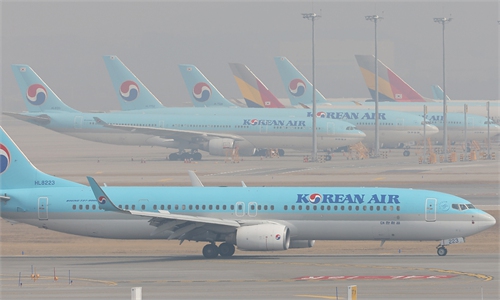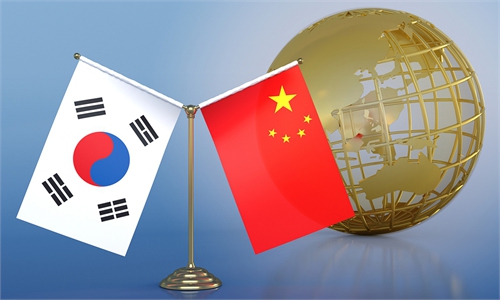
Live streamers show product in a broadcasting room at the South Korea pavilion during the 19th China-ASEAN Expo in Nanning, south China's Guangxi Zhuang Autonomous Region, Sept. 17, 2022.Photo:Xinhua
Many South Korean companies have seen a significant drop in revenues in the Chinese market since 2016, market research firm CEO Score said Wednesday.
The total combined revenues of these companies' Chinese operations last year amounted to 111.42 trillion won ($85.7 billion), down by 13.1 percent compared with 2016. If revenues from the battery and semiconductor sectors are excluded, the decline was a staggering 40 percent, CEO Score said in a statement.
The research firm conducted the analysis on the annual revenues of 113 South Korean companies' subsidiaries in China, which were among the top 500 South Korean companies.
The latest findings showed that the automobile and electronics companies, which were strong in China in the past, are losing pace in the market, though their sales of batteries and semiconductors increased.
To exemplify the trend, the study showed that in the auto sector, Hyundai Motor's subsidiary in China - Beijing Hyundai Motor - saw the steepest drop, with its revenue shrinking from 20.13 trillion won in 2016 to 4.9 trillion won last year, a plunge of 75.7 percent. Another automaker, Kia witnessed a sales drop of 80.8 percent to 1.88 trillion won during the same period.
Cui Dongshu, secretary-general of the China Passenger Car Association, told the Global Times that he believed that the main reason why South Korean automakers have lost popularity among Chinese consumers is that they could not update their technology and products promptly.
"They did not seize the opportunity brought by the new-energy vehicle trend in the world's largest auto market where competition is fiercer," Cui said.
Data from the Association showed that South Korean auto brands only have about 2 percent market share in China.
Samsung Electronics, another South Korean conglomerate, saw its revenue in China drop 43.5 percent to 9.68 trillion won last year from more than 17 trillion won in 2016, due to the withering of its smartphone and home appliance business in China.
CEO Score attributed South Korean firms' lackluster business in China to a complex set of factors including the China-US trade conflict, supply chain disruption and others.
Lü Chao, an expert on Korean Peninsula issues at the Liaoning Academy of Social Sciences, told the Global Times on Wednesday that the changing political and market environment could have affected South Korean businesses in China.
"Blaming Chinese regulation for exerting pressure on South Korean businesses is misplaced," Lü said.
According to Chinese analysts, China-South Korea bilateral ties took a dive during 2016-17 when South Korea started deploying the US Terminal High Altitude Area Defense (THAAD) anti-missile system, and the incumbent President Yoon Suk-yeol's pro-US shift in foreign policy has added to the difficulty in bilateral ties.
"Some South Korean companies are obviously impacted by the 'decoupling hype', choosing to take a wait-and-see approach. If the situation persists, it would mean more harm to normal economic ties between China and South Korea," Lü said.
In the first five months of the year, South Korea's exports to China dropped to $49.7 billion, a year-on-year decrease of 27.3 percent.
"Despite the uncertainty, South Korean businesses as I know are largely holding hope that bilateral relations should improve, and some companies are rooting for the Chinese market with more investment," Lü said.



